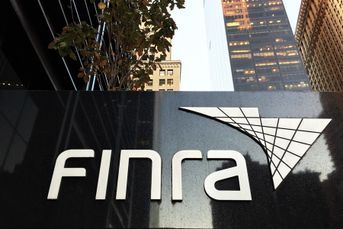Finra arbitration awards may mean gains for investors
Finra securities arbitration panels have handed investors two huge wins in recent months, but lawyers and industry observers are divided about whether such noticeable awards signal favorably for investors.
Finra securities arbitration panels have handed investors two huge wins in recent months, but lawyers and industry observers are divided about whether such noticeable awards signal favorably for investors.
Regardless, the awards — from the three-member panels of the Financial Industry Regulatory Authority Inc. of New York and Washington — are among the largest ever.
Last month, Merrill Lynch & Co. Inc. was ordered to pay $39.8 million to a group affiliated with the Freemasons in a case that stemmed from the collapse of Refco Inc.
The arbitration panel ruled that Merrill Lynch of New York must pay $30.6 million in compensatory damages — plus interest — to the Trustees of the Masonic Hall and Asylum Fund in Utica, N.Y.
The interest on the claim began accruing in November 2005 and totals $9.2 million.
In February, STMicroelectronics, a chip maker based in Geneva, was awarded $406 million by a Finra arbitration panel in a dispute with Credit Suisse Group Inc. of Zurich, Switzerland, over the unauthorized purchase of auction rate securities.
ANTI-WALL STREET FEELING
On one hand, the awards indicate that “the prejudice currently in the hinterlands is against Wall Street,” said Richard Nummi, a director with Accounting and Compliance International of New York.
An anti-Wall Street feeling is “reflected more and more in the size of [arbitration] awards being granted,” he said.
Others disagree.
“I can’t say we’re seeing a trend,” said Brian Smiley, president of the Public Investors Arbitration Bar Association of Norman, Okla., and a partner with Smiley Bishop & Porter LLP of Atlanta.
He said that it is “typically unusual to get large damages against major firms. There’s reluctance by arbitrators to slam big firms with big numbers.”
Regarding the recent Merrill Lynch claim, Mr. Smiley noted: “It helps to have a charity as a claimant.”
There are certain common elements in the two cases, one observer noted.
In both the Merrill Lynch and the Credit Suisse legal claims, the investors were institutional clients that invested in particular products, said Richard Ryder, editor of the Securities Arbitration Commentator, based in Maplewood, N.J.
“There’s a small light for retail investors,” he said. “In special situations where investors were sold the wrong goods, arbitrators are going to be sympathetic.”
In the Merrill Lynch case, the investor, the Trustees of the Masonic Hall and Asylum Fund, alleged that the firm and its subsidiary broker-dealer, Advest Group Inc. of Hartford, Conn., committed negligence, breached its contract and fiduciary duty, and misrepresented information about the Sphinx Managed Futures Index Fund LP.
Sphinx was a privately held fund of a business unit of the defunct commodities trader Refco of New York and was one of a group of funds that promised investors returns tied to the performance of the Standard & Poor’s Hedge Fund Index, according to published reports.
Refco collapsed in 2005 after it said that its chief executive hid $430 million in bad debt from the company’s auditors.
A Merrill Lynch spokesman, William Halldin, wrote in an e-mail that the firm is “disappointed with the decision, which we believe runs counter to the facts and the law.”
MERRILL’S RESPONSE
“This case arose from investments that predated Merrill Lynch’s acquisition of Advest,” he wrote. “The panel did award us rights to claims in the Sphinx Managed Futures insolvency and bankruptcy proceedings, and related matters, and we will pursue those claims.”
Since the events in the claim occurred before Merrill Lynch bought Advest Group, no Merrill Lynch adviser was involved in the matter, Mr. Halldin said.
Merrill Lynch’s acquisition of Advest Group in 2005 at the time was widely reported to be one of the most difficult and contentious deals in recent years, with Advest brokers leaving in droves.
STMicroelectronics said that the award covered “compensatory damages as well as interest, attorney’s fees and consequential damages.”
It came on top of $25 million already awarded.
STMicroelectronics went to arbitration with Credit Suisse because the firm allegedly had bought auction rate securities instead of the federally guaranteed student loan securities for which it had asked, according to the company.
Last winter, the ARS market froze amid the downturn in the credit markets.
“We believe the arbitration panel’s decision is legally flawed, and we look forward to presenting our case in court,” David Walker, a Credit Suisse spokesman, wrote in an e-mail.
E-mail Bruce Kelly at [email protected].
Learn more about reprints and licensing for this article.








